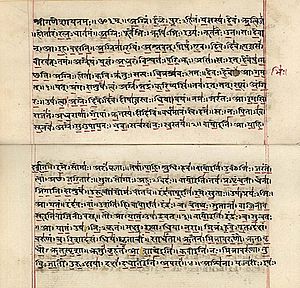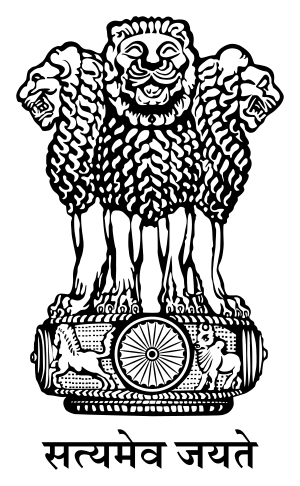Satya facts for kids
Satya is a Sanskrit word that means "truth" or "essence." It is also a very important good quality, or virtue, in many Indian religions. It means being truthful in your thoughts, what you say, and what you do. In Yoga, Satya is one of the five yamas. These are rules for living a good life. Satya means avoiding lies and not twisting the truth in your words and actions.
Contents
Understanding Satya: Truth and Reality
The word Satya has changed over time. In ancient texts called the Vedas and Sutras, it became an important idea about being truthful. It means that your thoughts, words, and actions should match what is real and true.
The Meaning of 'Sat'
The word Sat is the base for many Sanskrit words, like Satya ("truth"). Sat can mean several things:
- "Absolute reality"
- "Fact"
- "That which is real and unchanging"
- "That which has no mistakes or distortions"
- "That which is beyond time, space, and people"
- "That which is everywhere in the universe"
Sat is often used as a prefix in old Indian writings. It means something good, true, real, or lasting. For example, sat-sastra means a true teaching. Sat-van means someone who loves the truth. Words with Sat often refer to the "Universal Spirit" or "Soul of the World."
The opposite of Sat is asat. This means delusion, something distorted, or untrue. It refers to a fleeting idea that is wrong or false. The ideas of Sat and Asat are famous in the Pavamana Mantra:
|
Asato mā sad gamaya |
Lead me from delusion to truth |
Sat is one of the three main qualities of Brahman. Brahman is the ultimate reality in Hinduism. This link between Sat (truth) and Brahman (ultimate reality) is also seen in Hindu beliefs about the universe. Satyaloka, the highest heaven, is where Brahman lives.
Satya in Hinduism
Ancient Vedic Texts
Satya is a very important idea in the Vedas, which are ancient Hindu scriptures. It is connected to Ṛta, which means order, balance, and harmony. In the Vedas, Ṛta comes from Satya. It helps the universe and everything in it work properly. Satya is seen as essential. Without it, the universe would fall apart and not function.
In the Rigveda, the opposite of Ṛta and Satya is anrita and asatya (falsehood). Being truthful is seen as a way to respect the divine. Falsehood is considered a sin. Satya includes actions and words that are factual, real, and respectful of Ṛta. This is found in many parts of the Rigveda. Satya is not just about the past. It also includes what you do now and in the future. It is about building and establishing truth in the world.
Upanishads: Deep Meanings
Satya is talked about a lot in the Upanishads. These are philosophical texts within Hinduism. In the Brihadaranyaka Upanishad, Satya is called the way to reach Brahman. It is also seen as Brahman itself (the true self). In one hymn, Satya (truth) is compared to Dharma (morality or righteousness):
Nothing is higher than the Law of Righteousness (Dharma). The weak overcomes the stronger by the Law of Righteousness. Truly that Law is the Truth (Satya); Therefore, when a man speaks the Truth, they say, "He speaks Righteousness"; and if he speaks Righteousness, they say, "He speaks the Truth!" For both are one.
—Brihadaranyaka Upanishad, I.4.xiv
The Taittiriya Upanishad says, "Speak the Satya (truth), act according to the Dharma (morality)."
Truth is praised in the Upanishads. It is believed that truth always wins in the end. The Mundaka Upanishad says:
सत्यमेव जयते नानृतं
Translation: Truth alone triumphs, not falsehood.—Mundaka Upanishad, 3.1.6
The Sandilya Upanishad defines Satya as "speaking the truth that helps all living things, through your mind, words, or body."
Great Epics
The Shanti Parva section of the Mahabharata, a famous Indian epic, says: "Good people believe that forgiveness, truth, honesty, and kindness are the most important virtues. Truth is the main idea of the Vedas."
The Mahabharata often stresses that Satya is a basic virtue. This is because everything and everyone depends on truth.
|
सत्यस्य वचनं साधु न सत्याद विद्यते परम |
Speaking the truth is good. There is nothing better than truth. Everything is held up by truth, and everything relies on truth. Even bad people promise to be truthful among themselves. They stop fighting and work together, trusting in truth. If they lied to each other, they would surely be destroyed. |
| —The Mahabharata, Chapter CCLIX: Shanti Parva |
Yoga Sutras: A Path to Truth
In the Yoga Sutras of Patanjali, it is written: "When someone is truly committed to speaking the truth, the results of their actions will follow them." In Yoga, Satya is one of the five yamas, or good restraints. The others are ahimsa (not harming others), asteya (not stealing), brahmacharya (self-control), and aparigraha (not being greedy).
Patanjali says Satya means not being false in your actions, words, or thoughts. You might not always know the full truth. But you know if you are lying, exaggerating, twisting facts, or deceiving. Satya in Yoga is about stopping yourself from doing these things. This can be by staying silent or by speaking the truth without any distortion.
Satya in Jainism
Satya is one of the five main promises in Jainism. Mahavira, a great teacher, also taught about Satya. In Jainism, it means not lying or saying things that are not helpful. Lying comes from strong feelings like anger or greed. Because of this, lying can cause hiṃsā (harm).
According to a Jain text called Sarvārthasiddhi: "Anything that causes pain and suffering to living beings is not good, whether it is fact or not."
Another Jain text, Puruşārthasiddhyupāya, explains:
All these actions (like injury, falsehood, stealing) are hiṃsā because doing them makes the soul impure. Falsehood and others are mentioned separately to help students understand with examples.
—Puruşārthasiddhyupāya (42)
Satya in Buddhism
In Buddhism, the word Satya (or sacca in Pali) means "reality" or "truth." The "Four Noble Truths" are a short summary of all Buddhist teachings. They include:
- The truth of suffering (our everyday mental and physical problems).
- The truth of the cause of suffering (craving or wanting things).
- The truth of stopping suffering (Nibbana or nirvana, a state of peace).
- The truth of the Noble Eightfold Path, which leads to stopping suffering.
Satya in Sikhism
In Sikhism, truth is also very important. The holy book, Guru Granth Sahib, says:
- ਜਿਨਾ ਰਾਸਿ ਨ ਸਚੁ ਹੈ ਕਿਉ ਤਿਨਾ ਸੁਖੁ ਹੋਇ ॥
- Those who do not have the Assets of Truth—how can they find peace?
- ਖੋਟੈ ਵਣਜਿ ਵਣੰਜਿਐ ਮਨੁ ਤਨੁ ਖੋਟਾ ਹੋਇ ॥
- By dealing their deals of falsehood, their minds and bodies become false.
- ਫਾਹੀ ਫਾਥੇ ਮਿਰਗ ਜਿਉ ਦੂਖੁ ਘਣੋ ਨਿਤ ਰੋਇ ॥੨॥
- Like the deer caught in the trap, they suffer in terrible agony; they continually cry out in pain.
- ਖੋਟੇ ਪੋਤੈ ਨਾ ਪਵਹਿ ਤਿਨ ਹਰਿ ਗੁਰ ਦਰਸੁ ਨ ਹੋਇ ॥
- The counterfeit coins are not put into the Treasury; they do not obtain the Blessed Vision of the Lord-Guru.
- ਖੋਟੇ ਜਾਤਿ ਨ ਪਤਿ ਹੈ ਖੋਟਿ ਨ ਸੀਝਸਿ ਕੋਇ ॥ खोटे जाति न पति है खोटि न सीझसि कोइ ॥
- The false ones have no social status or honor. No one succeeds through falsehood.
- ਖੋਟੇ ਖੋਟੁ ਕਮਾਵਣਾ ਆਇ ਗਇਆ ਪਤਿ ਖੋਇ ॥੩॥
- Practicing falsehood again and again, people come and go in reincarnation, and forfeit their honor.
- ਨਾਨਕ ਮਨੁ ਸਮਝਾਈਐ ਗੁਰ ਕੈ ਸਬਦਿ ਸਾਲਾਹ ॥
- O Nanak, instruct your mind through the Word of the Guru's Shabad, and praise the Lord.
- ਰਾਮ ਨਾਮ ਰੰਗਿ ਰਤਿਆ ਭਾਰੁ ਨ ਭਰਮੁ ਤਿਨਾਹ ॥
- Those who are filled with the love of the Name of the Lord are not weighed down by doubt.
- ਹਰਿ ਜਪਿ ਲਾਹਾ ਅਗਲਾ ਨਿਰਭਉ ਹਰਿ ਮਨ ਮਾਹ ॥੪॥੨੩॥
- Those who chant the Name of the Lord earn great profits; the Fearless Lord lives within their minds.
—Guru Granth Sahib, 4.23
Another Sikh teaching says: "True followers do not like falsehood; they are filled with Truth; they love only Truth. Those who do not believe do not like the Truth; false are the foundations of the false. If you are filled with Truth, you will meet the Guru. The true ones become one with the True Lord."
India's National Motto
The motto of India's national emblem is Satyameva Jayate. This phrase means 'Truth alone triumphs'. It shows how important truth is to the country.
See also
- Dharma
- Rta
- Sacca
- Satnam
- Satyaloka
- Satya Yuga
- Truth
 | John T. Biggers |
 | Thomas Blackshear |
 | Mark Bradford |
 | Beverly Buchanan |



